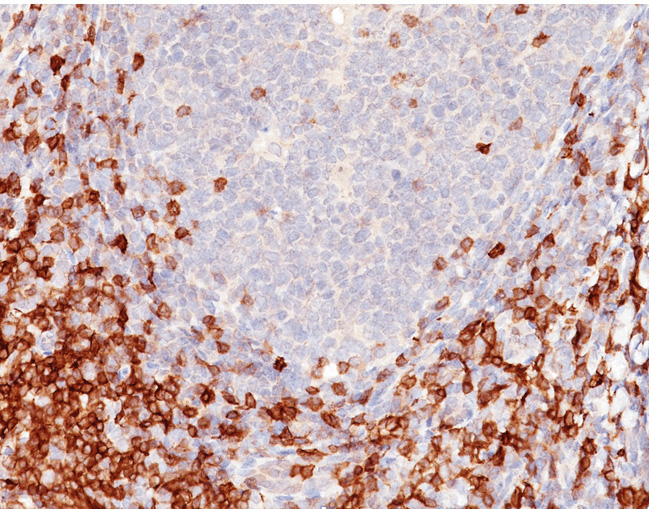CD5 Mouse Monoclonal Antibody [Clone ID: C5/473+CD5/54/F6]
Specifications
| Product Data | |
| Clone Name | C5/473+CD5/54/F6 |
| Applications | FC, IF, IHC, IP, WB |
| Recommended Dilution | Western Blot: 0.5-1 μg/ml. Immunoprecipitation: 0.5-1 μg/500 μg protein lysate. Flow Cytometry: 0.5-1 μg/106 cells. Immunofluorescence: 0.5-1 μg/ml. Immunohistochemistry on Frozen and Formalin-Fixed Paraffin Sections: 0.5-1 μg/ml for 30 minutes at RT. Staining of formalin-fixed tissues requires boiling tissue sections in 10mM citrate buffer, pH 6.0, for 10-20 min followed by cooling at RT for 20 minutes. Positive Control: 293T, Ramos, or MOLT-4 Cells, Tonsil. |
| Reactivities | Human |
| Host | Mouse |
| Isotype | IgG1 |
| Clonality | Monoclonal |
| Immunogen | Human CD5 recombinant protein (C5/473) and A synthetic peptide from the intracellular region of Human CD5 (CD5/54/F6). |
| Specificity | Recognizes a 67kDa transmembrane protein, which is identified as CD5. The CD5 antigen is found on 95% of thymocytes and 72% of peripheral blood lymphocytes. In lymph nodes, the main reactivity is observed in T cell areas. Anti-CD5 is a pan T-cell marker that also reacts with a range of neoplastic B-cells, e.g. chronic lymphocytic leukemia/small lymphocytic lymphoma (CLL/SLL), mantle cell lymphoma, and a subset (~10%) of diffuse large B-cell lymphoma. CD5 aberrant expression is useful in making a diagnosis of mature T-cell neoplasms. Anti-CD5 detection is diagnostic in CLL/SLL within a panel of other B-cell markers, especially one that includes anti-CD23. Anti-CD5 is also very useful in differentiating among mature small lymphoid cell malignancies. In addition, anti-CD5 can be used in distinguishing thymic carcinoma (+) from thymoma (-). Anti-CD5 does not react with granulocytes or monocytes. Cellular Localization: Cell surface. |
| Formulation | 10mM PBS State: Purified State: Liquid purified IgG fraction from Bioreactor Concentrate Stabilizer: 0.05% BSA Preservative: 0.05% Sodium Azide |
| Concentration | 0.2 mg/ml |
| Purification | Protein A/G Chromatography |
| Predicted Protein Size | 67 kDa |
| Gene Name | CD5 molecule |
| Database Link | |
| Background | CD5, a 67KDa Type I transmembrane glycoprotein, is a member of SRCR superfamily expressed specifically of thymocytes, mature T-cells and B-1a cells. CD5 has an extracellular domain with 3 SRCR domains and cytoplasmic tail is devoid of any intrinsic enzyme activity. CD5 functions as a dual receptor modulating either positive or negative co-stimulatory signals depending on the cell type and the developmental stage. It binds CD72 and provides co-stimulatory signal for T-cell growth. CD5 plays an important role in thymocyte development and also fine-tunes TCR signaling. It is associated with antigen-specific receptor complex expressed on T-cells and B-1a cells and regulates T and B-cell mediated responses. CD5 signaling involves various kinases including PI3K, Src family tyrosine kinases, CKII, Ras GAP, and members of MAPK. |
| Synonyms | CD5, LEU1 |
| Reference Data | |
Documents
| Product Manuals |
| FAQs |
| SDS |
{0} Product Review(s)
0 Product Review(s)
Submit review
Be the first one to submit a review
Product Citations
*Delivery time may vary from web posted schedule. Occasional delays may occur due to unforeseen
complexities in the preparation of your product. International customers may expect an additional 1-2 weeks
in shipping.






























































































































































































































































 Germany
Germany
 Japan
Japan
 United Kingdom
United Kingdom
 China
China



